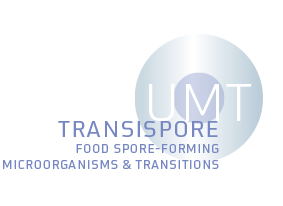
Coordination
Partners
Objectives
The work of the Actia Transispore Joint Technological Unit focuses on the use of spore-forming micro-organisms (bacterial and fungal) to guarantee food safety and quality in the current context of multiple transitions (climate, energy, food, etc.).
Their main habitat, the soil, and the complex life cycle of these micro-organisms, including the formation of spores that are resistant to decontamination treatments, mean that they are of major importance in a large number of food processing and/or preservation processes, where they represent the main limit to the shelf life of products.
The aim of the UMT is to provide answers to a number of questions on the interactions between spore-forming micro-organisms and 'current transitions', which are characterized, for example, by rising production or storage temperatures, the need to adapt certain practices and use green technologies, the replacement of animal proteins, etc., but also to complete the tools for predicting shelf life.
The Actia Transispore Joint Technological Unit (2024-2028) is located in Quimper. This UMT is in line with our previous UMT Alter’ix (2019-2023).
Actions
Sporulated microbiota of the food system in a context of transitions:
- Moulds and spore-forming bacteria in relation to climate change
- Green technologies (microwaves, DIC, UV, ozone): effects on spore-forming microorganisms
- Replacing animal proteins: what consequences for spore-forming microbiota?
Predicting shelf life:
- Methodologies for reproducing an 'industrial' physiological state for validation purposes
- Modelling metabolite production and impact on organoleptic properties
- Packaging reuse and shelf life
- Implementation of the models developed in digital tools.







